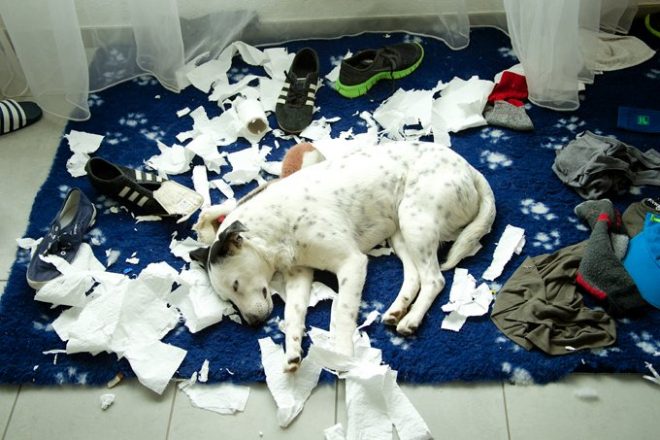
Living these busy lives of ours means often pets are left at home when owners go to work or spend a great deal of time outside of the house because of things such as school or family commitments. Many times, these pets suffer from insufficient physical and mental stimulation. Rather than whine about there being nothing to do, your pet may be stirring up trouble.
 In the absence of enough physical or mental stimulation, our pets may engage in activities of their own making. These activities can include appropriate behaviors, such as playing with toys, or inappropriate behaviors, such as chewing on furniture or knocking items off a table. Additionally the veterinarians in Richmond Hill hear about excessive attention seeking, unruliness, vocalizations, playing keep away with an owner’s items, trying to escape or self-directed behavior, such as a pet chasing his own tail. Dogs may engage in normal “dog” behavior, such as digging in the dirt, but to a greater extent than is tolerable — so instead of one hole in the lawn, your backyard may look as if it is being excavated. For cats, normal “cat” behavior includes chasing moving objects — but that could include your ankles as you walk around the house. If your pet exhibits any of these behaviors excessively, ask yourself how much physical and mental stimulation you are offering him.
In the absence of enough physical or mental stimulation, our pets may engage in activities of their own making. These activities can include appropriate behaviors, such as playing with toys, or inappropriate behaviors, such as chewing on furniture or knocking items off a table. Additionally the veterinarians in Richmond Hill hear about excessive attention seeking, unruliness, vocalizations, playing keep away with an owner’s items, trying to escape or self-directed behavior, such as a pet chasing his own tail. Dogs may engage in normal “dog” behavior, such as digging in the dirt, but to a greater extent than is tolerable — so instead of one hole in the lawn, your backyard may look as if it is being excavated. For cats, normal “cat” behavior includes chasing moving objects — but that could include your ankles as you walk around the house. If your pet exhibits any of these behaviors excessively, ask yourself how much physical and mental stimulation you are offering him.
Much like humans, dogs and cats appear to enjoy regular mental stimulation and physical activity. Domesticated cats and dogs still engage in certain species-specific activities, such as hunting for food, which can take up a large portion of their waking hours. To help satisfy these compulsions, owners can have their pets “work” for their food. One way the veterinarians in Richmond Hill recommend is at each meal, divide a portion of your pet’s meal into two or three food puzzle toys. These toys are designed to release food items gradually as your pet interacts with the toys. Some people will even feed exclusively from puzzle toys to keep their pet actively going after their food. It also helps to slow down the eating process.
portion of your pet’s meal into two or three food puzzle toys. These toys are designed to release food items gradually as your pet interacts with the toys. Some people will even feed exclusively from puzzle toys to keep their pet actively going after their food. It also helps to slow down the eating process.
Social interaction is vital as well. Make sure you spend quality one-on-one time with your pet. It could be engaging in games, training desirable behaviors using positive reinforcement, or just petting or snuggle time. Remember, no matter what the activity is, spending time with your pet is one surefire way to combat his boredom. Focus on channeling your pet’s energy into healthier outlets. Whether  with you or a well-matched canine friend a good bout of playtime can tire a dog out good and quick!
with you or a well-matched canine friend a good bout of playtime can tire a dog out good and quick!
Sometimes doing something as simple as putting away some of your pet’s toys away and swapping them out each day for a new selection can keep things fresh and stimulating for your pets. Again, the veterinarians in Richmond Hill recommend interactive, puzzle type toys to keep your pets engaged for longer periods of time.
And if you’ve tried all these recommendations but still feel like your pet is “acting bored,” don’t hesitate to seek professional help from your veterinarians in Richmond Hill.
If you found this blog informative, please share it with your friends on Facebook . Please call us (905)764-1144 for any questions or search for more articles on our website: www.bayviewsevenanimalhospital.ca
Sincerely,
“Your healthy companion is our pride & joy”
Bayview Seven Animal Hospital, a veterinary clinic located on Hwy.7, one block West of Yonge, serving all pets in Markham, Richmond Hill, Thornhill, Vaughan and North York since 1988. We are your family vets for dogs, cats, rabbits, pocket pets and birds.
Disclaimer: No part of this website constitutes medical advice. Readers are advised to consult with their veterinarian.
